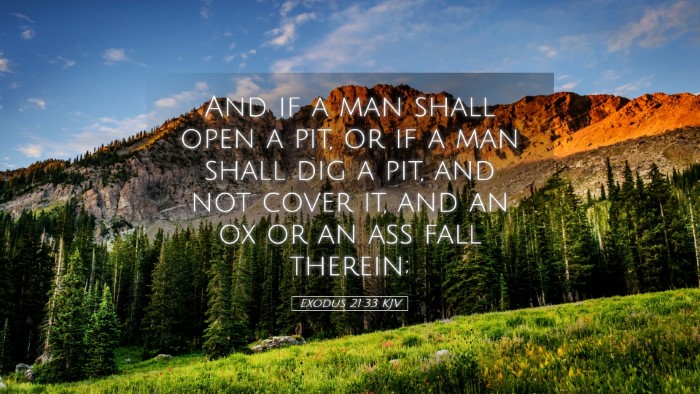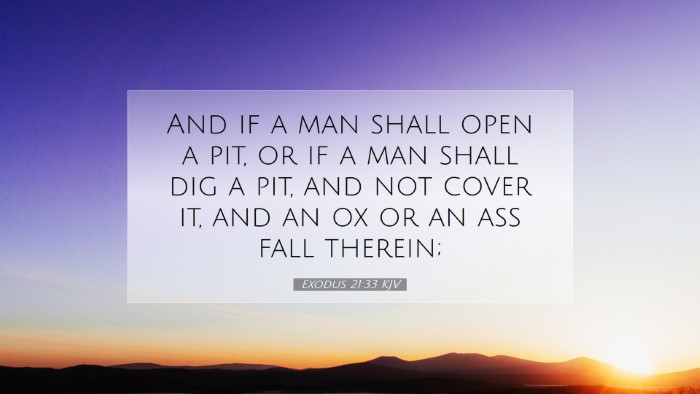Exodus 21:33 - Commentary and Insights
Verse: "And if a man shall open a pit, or if a man shall dig a pit, and not cover it, and an ox or an ass fall therein;" (Exodus 21:33)
Introduction
This verse is part of the broader section in Exodus where the Law is established to govern the behavior of the Israelites. The focus on liability in this legislation reflects God's concern for social order and personal responsibility. This commentary synthesizes insights from various public domain sources, providing relevance for pastors, students, theologians, and Bible scholars.
Contextual Overview
The regulatory nature of Exodus 21-23 involves responsibilities and moral duties within the community. The case of a pit represents a broader principle of negligence and accountability.
Insights from Commentators
Matthew Henry's Commentary
Henry emphasizes that this law lays the foundation for the principles of justice and responsibility. The act of digging a pit without covering it symbolizes negligence. Those who fail in their duty of care are held accountable for the consequences of their actions.
- Negligence and Responsibility: Henry notes that every individual has a duty to foresee the potential harm in their actions. The man who digs the pit symbolizes anyone who engages in activities that pose risks to others.
- Social Justice: He links this verse to the larger theme of social justice, stressing that individuals must consider the welfare of their neighbors. Acts of negligence lead to harm, and ensuring safety is a community responsibility.
Albert Barnes' Notes on the Bible
Barnes offers a detailed analysis of the legal and practical implications of this verse. He regards the opened pit as a metaphor for risks that arise from one's actions and the significance of covering one's liabilities.
- Legal Ramifications: According to Barnes, this law sets a precedent for legal accountability in the case of property damage or harm caused by negligence. Coverage of pits symbolizes due diligence that is required from individuals.
- Preventative Measures: Barnes points out that the law demands proactive measures to prevent foreseeable dangers. The absence of a cover signifies a lapse in responsibility that could lead to unintended consequences.
Adam Clarke's Commentary
Clarke analyzes the cultural context of the law, stating that the agrarian lifestyle of the Israelites made such regulations necessary for the safety of both people and livestock.
- Agrarian Context: Clarke highlights that the presence of livestock is integral to the community’s economy and livelihood. Therefore, the punitive aspect of this law serves to protect essential property.
- Broader Moral Implications: Clarke underscores that beyond the legal consequences, there lies a moral teaching: individuals must actively care for the safety of others in their community.
Theological Implications
This verse opens discussion on several theological themes, particularly concerning moral living and community ethics.
- Divine Order: The law exemplifies God’s order within society, urging believers to live harmoniously and responsibly. It reflects God's character as just and caring.
- Call to Action: The verse compels believers to be proactive in safeguarding the well-being of others — a responsibility echoed throughout the New Testament teaching on love and neighborly care.
Practical Applications
For pastors and church leaders, this scripture can be a foundation for teaching about personal and communal responsibility. The insights derived invite several practical applications:
- Accountability Models: Establishing frameworks within church communities where members are held accountable for their actions can mirror the principles laid out in this verse.
- Encouragement of Preventative Practices: Just as the pit should have been covered, individuals can be encouraged to anticipate and mitigate risks in their lives, including spiritual, emotional, and physical areas.
- Community Care: Churches should be mobilized to address the needs of those who might fall into metaphorical pits, engaging in social justice and support initiatives.
Conclusion
Exodus 21:33 serves as a powerful reminder of the principles of responsibility, care for one another, and the need for proactive measures to protect those in our community. The commentaries from Henry, Barnes, and Clarke elucidate layers of meaning that enhance our understanding of this law's place in the life of the community and its application today. As modern believers, we are called to embody these principles in our daily lives, ensuring that we do not neglect our duty to safeguard others.


